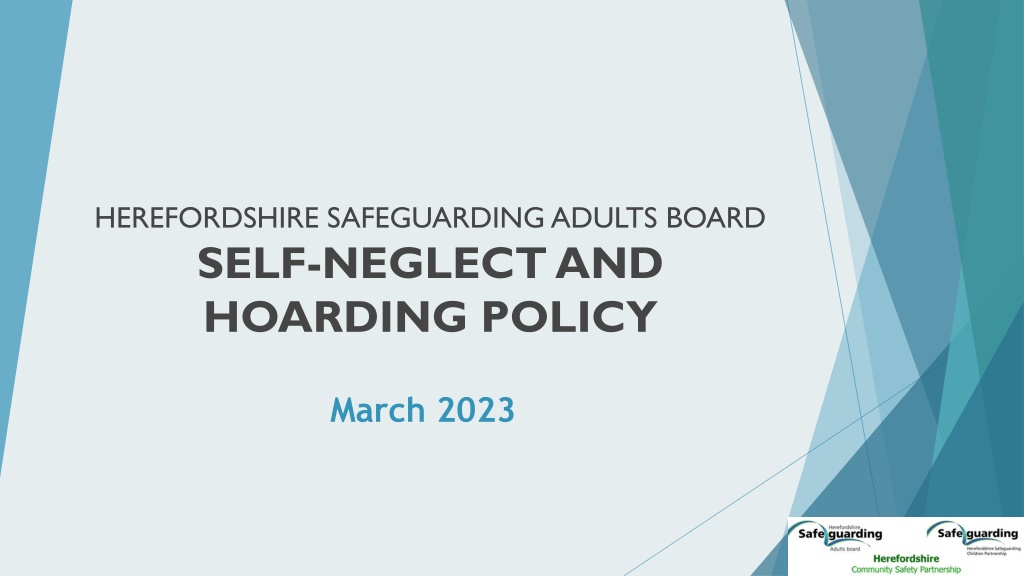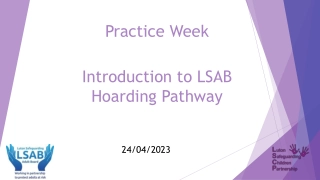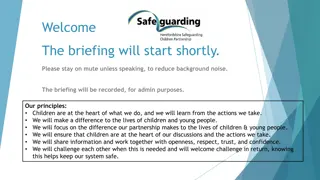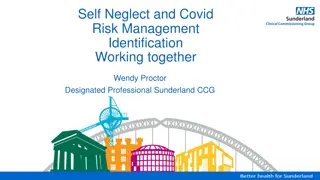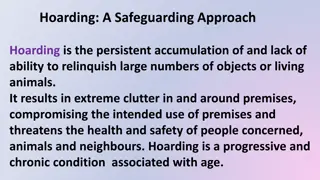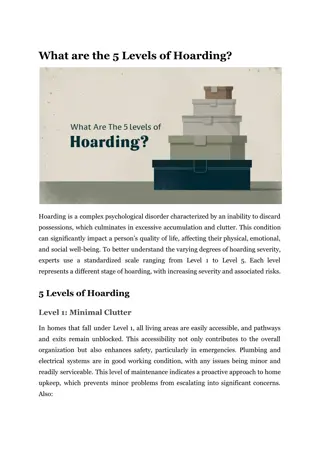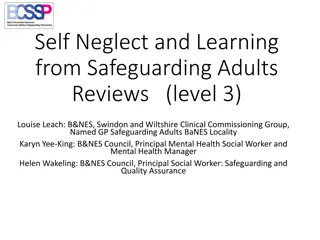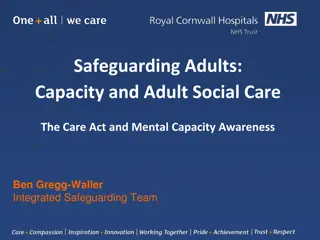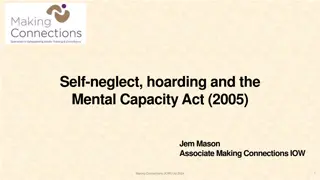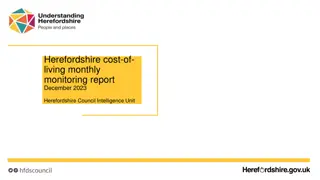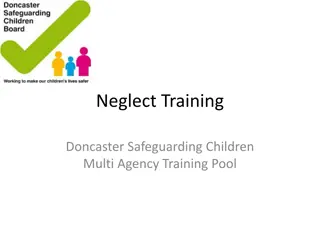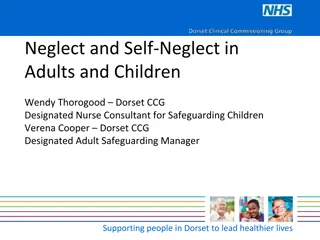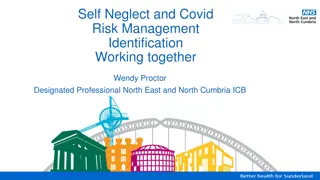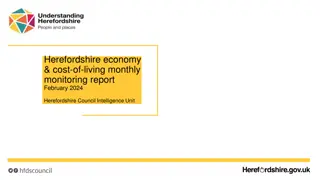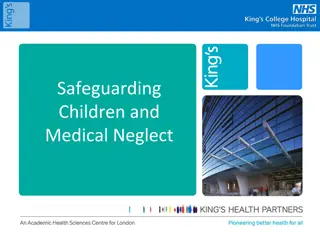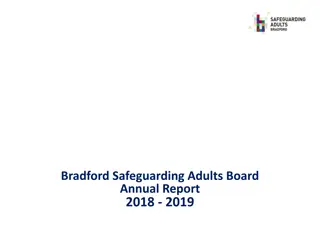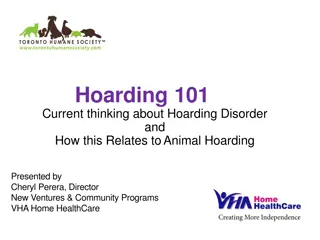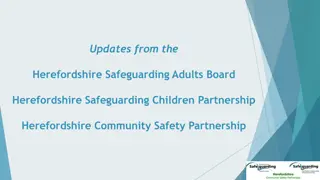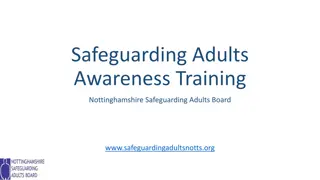Herefordshire Safeguarding Adults Board Self-Neglect and Hoarding Policy Overview
The policy addresses self-neglect and hoarding behaviors, emphasizing the broad spectrum it covers, including lack of self-care and failure to seek assistance for critical needs. It highlights the complexity faced by practitioners in balancing autonomy and duty of care. The background data reflects the prevalence of concerns related to self-neglect, with examples illustrating the challenges individuals may face. The policy aims to guide practitioners in supporting individuals at risk of harm due to self-neglect.
Download Presentation

Please find below an Image/Link to download the presentation.
The content on the website is provided AS IS for your information and personal use only. It may not be sold, licensed, or shared on other websites without obtaining consent from the author. Download presentation by click this link. If you encounter any issues during the download, it is possible that the publisher has removed the file from their server.
E N D
Presentation Transcript
HEREFORDSHIRE SAFEGUARDING ADULTS BOARD SELF-NEGLECT AND HOARDING POLICY March 2023
Definition The Care and Support Statutory guidance 2020 states that self-neglect covers a wide range of behaviour neglecting to care for one s personal hygiene, health or surroundings and includes behaviour such as hoarding but does not give specific details
Definition and Behaviours Self-neglect typically features : Lack of self-care to an extent that it threatens their personal health and safety. Failure to attend to their living environment to the extent that it becomes hazardous to self or others e.g. fire risk, infestation, lack of sanitation. Failure to seek help or access services to meet their critical health and social care needs.
Complex and Challenging Self-neglect can be a complex and challenging issue for practitioners to address, not least because of difficulties in striking a balance between respecting a person's right to autonomy and fulfilling the statutory duty of care to protect their health and wellbeing
Background 425 concerns of self-neglect raised to adult safeguarding (April 2022 December 2022), of which 21 progressed to a safeguarding adult enquiry. Where a concern raised did not progress to a safeguarding enquiry Care Act / Strengths Based Assessment (Section 9) Signposting to other services, e.g. health Other possibilities may be no further action Prominent theme - Safeguarding Adult Reviews
Case Example Male, late 60s, living in family home by himself Home is in disrepair, multiple issues plumbing, electricity Home is cluttered with a range of broken items from his former profession Started to develop leg sores, struggling to get out to purchase food, having falls Resistant to most professionals, but works with District Nurses This is one example, but self-neglect can come in many different forms
Purpose of the policy Guidance for practitioners who have contact with individuals, who persistently self-neglect which places them at risk of significant harm aims to support good practice and establishes a multi-agency pathway to provide support policy applies to all practitioners whether salaried or volunteers No Wrong Door
This policy provides: Definitions Details and application of Legal Frameworks Information on how to work with risk and harm Considering causes of a person s self-neglect Herefordshire pathways
Discuss You have met a person and you are concerned about self- neglect, what are the first three things you would consider or do?
Herefordshire Multi-Agency Self-neglect Pathway Concerned about an individual neglecting themselves, their home or rough sleeping Discuss concerns with the person. Obtain consent to make a referral, unless risk of significant harm to the person or others. Referral to Advice and Referral Team (ART). Continue to work with the individual to address self-neglect concerns. ART Customer Service Officer contacts the person for initial conversation. If person consents to support Strengths Based Assessment (Section 9), or if no identified risks, then signposting / possibly no further action If person does not consent, are there significant safeguarding concerns? If so, s42 safeguarding enquiry
If there are no significant concerns, and adult does not consent to referral A person with capacity to understand the risks has the right to refuse support. Refusal does not mean that all intervention stops: multi-agency plan put in place to build relationship and offer support. If the person does not want any action taken, it may be reasonable not to intervene further, provided: No one else is at risk Vital interests are not compromised ie no immediate risk of death or life changing harm Decisions are fully explained and recorded Other agencies have been informed and involved as necessary
Applying the Principles of Making Safeguarding Personal and Strengths-based Practice Sets out guiding principles to consider when engaging with individuals who may self-neglect Start with the assumption that the individual is best placed to judge their wellbeing Pay close attention to individual s views, wishes, feelings and beliefs Preventing or delaying development of needs for care and support and reducing needs that exist The need to protect people from abuse and neglect
Principles of Engagement Newcastle Adult's Safeguarding Board - 8 Principles of Engagement YouTube
This Policy provides: Advice and suggestions Engaging with the person Building Trust Importance of consistency and time Long term approach Be clear why you are concerned what are the risks? Recognise the persons fear of loosing control often the behaviour has a practical or emotional reason behind it How can you work with them to mitigate risks? Joint goals, which look at progress rather than just end game Use their language Focus on strengths Acknowledge and build on progress Enforcement LAST RESORT
Thank you Access the policy and learning briefing: https://www.herefordshiresafeguardingboards.org.uk/professional- resources/adults-policies-guidance
